Nasir Hussain may have made his Tumsa Nahin Dekha story into four separate – and equally successful – films, but did that induce others to be original? On the contrary. Narinder Bedi, at least, probably seemed to think that what worked for Nasir Hussain might well work for him. Therefore, Mere Sanam, which has a storyline similar in many ways to Tumsa Nahin Dekha. (Both films also have fantastic music by OP Nayyar, by the way).
There is, for a start, the parent who has been separated from an infant offspring, and who has ended up bringing up someone else’s child instead. In this case, the parent in question is Mr Mehra (Nasir Hussain; I hasten to point out – to those who may not be in the know – that the actor Nasir Hussain is not the same as the producer/writer/director Nasir Hussain, who wrote and directed Tumsa Nahin Dekha). Mr Mehra had gone off to Africa on business years ago, leaving behind in India his wife and his baby daughter. On his return to India, replete with funds, he discovered that in the wake of the Partition, his wife and daughter had gone missing, presumed dead.
Mr Mehra has therefore brought up the son of a dear friend (now dead). The son (Biswajeet) is named Ramesh Kumar, though everybody – including Mr Mehra – refers to him simply as Kumar. Kumar handles Mr Mehra’s ‘industrial empire’ (that’s how Mr Mehra constantly refers to his many business ventures).
Now Mr Mehra has decided that Kumar must get married, to the daughter – she never puts in an appearance, though, in the film – of a wealthy business associate.
Kumar is, unsurprisingly, not keen on his life being thus charted out for him. But his protests are summarily brushed aside by Mr Mehra, who makes it clear that money is everything and that this marriage will prove very profitable for the Mehra industrial empire. Poor Kumar is left seething, and takes himself off to Kashmir, where he’s supposed to negotiate a deal of some sort. [That’s the last we hear of it in the film. There is also some vague reference to Kumar’s not letting on to anyone who he is – manager of the Mehra industrial empire, and so on – so that he goes incognito. This doesn’t happen, either].
But Kashmir means romance, and Kumar soon finds it. Or tries to, by singing to a group of girls – more specifically, one girl, Neena (Asha Parekh) whom he meets while driving along. Neena makes faces at him, smiles coquettishly behind his back, and doesn’t seem too sure of her emotions towards this roadside Romeo.
When Kumar reaches the Mehra mansion, he discovers that the man in charge, Shyam (Pran) has surreptitiously converted the house into a hotel. The hotel’s operations are being handled by the lunatic father-and-son pair of Baanke and Pyaare (Dhumal and Rajendranath, respectively). Baanke is very keen that Pyaare should get married – and that too to one of the girls currently staying at the hotel.
When Kumar finds out his house is now a hotel, Shyam does his best to convince him that it’s all for the best – does Kumar realise how much money is simply sunk in the upkeep of the house every year? This way, with the place on rent and drawing an income, at least they’re utilising the premises. Kumar tries to demur, but eventually gives up.
Part of that happens because he discovers who is occupying a major part of the hotel: a large group of girls from Lucknow, under the chaperonage of Savitri Devi (Achla Sachdev), who is the warden of a college hostel. For Kumar, the very fact that Savitri Devi’s daughter – Neena, she of the flashing eyes, back on the road – is enough for him to capitulate. Let them stay. He does try to tell them who he is [what happened to his resolve to remain incognito?]…
[PS. Notice Laxmi Chhaya, on Asha Parekh’s right? She’s one of Neena’s friends, and there’s a tiny comic side plot involving her and Pyaare].
…but, behind Kumar’s back, Shyam tells the girls that this poor young man who’s arrived, claiming to be the owner of this grand hotel, is actually a now-bankrupt youth who had been brought up here. His family was forced to sell the property to Shyam, but the young man – Kumar – has not been able to tolerate the shock of poverty and has gone bonkers, so still imagines he’s lord and master here. Will the ladies please humour him? [There seems no point to this ploy of Shyam’s, since everybody soon seems to forget that Kumar is supposed to be nuts.]
We now get to watch plenty of songs against pretty backdrops of everything from the Dal Lake and the snow-capped peaks of Kashmir, to fields of poppies, as Kumar and Neena get better acquainted. She’s not very encouraging to begin with, but after he’s gotten himself thrashed (and wrecked a nightclub in the bargain!) just to protect Neena from the pawing of a dancer, she changes her mind.
Neena’s mother Savitri Devi has, all this while, been in hospital with a fractured leg. When she finally limps back to the hotel, it is to discover that Neena has been romancing Kumar. The result is that Savitri Devi blows her top and chastises her daughter for acting the strumpet.
Meanwhile, Shyam’s villainy is further revealed. Not only has he converted the mansion into a hotel, he’s also running some sort of drug racket on the side, dealing in cocaine and whatnot. One of his henchmen, an old servant named Lal Chand (? Probably Dev Kishan, as identified by Raja) is sent by Shyam with a message for Savitri Devi. He sees Savitri Devi for the first time and is struck dumb. When he returns to Shyam, it is with momentous news: Savitri Devi is Mr Mehra’s long-lost wife! Lal Chand should know; he worked at the Mehras’ house for over ten years.
This provides much food for thought. If Savitri Devi is Mrs Mehra, then her daughter Neena is heiress to the Mehras’ many millions. If Shyam is able to get married to Neena, he’ll be laughing all the way to the bank. Unfortunately for Shyam, though, Neena is pretty sure whom she wants to marry, and it isn’t Shyam.
So Shyam starts buttering up Neena’s mother – who soon decides that Shyam is the only man she would want for a son-in-law.
… and Shyam goes to meet an old friend, Kamini ‘Kammo’ (Mumtaz. Kammo – remember what had I said in my Tumsa Nahin Dekha post about Kammos being as common as fleas back then? I rest my case). For a hefty fee, Kammo agrees to help Shyam prise apart the Kumar-Neena jodi.
The first step is to lure Kumar, with a forged note supposedly from Neena, asking him to meet her in a hotel room. Of course, when Kumar arrives and enters the room, it’s to find Kammo, who sets about practising her charm on him. Unknown to all except Kammo, there’s a photographer – Shyam, one assumes – hidden away in the room too, industriously clicking photos of Kammo and Kumar together.
The scene is being set for further villainy and more melodrama. More songs, too, thankfully (including a very beautiful ‘sad song’). There will be a murder, some misplaced suspicion, much yelling and name-calling, some silly comedy – and the absolutely mandatory happy end.
Would I recommend Mere Sanam? As far as I’m concerned, it’s a thoroughly entertaining film, with one of the best scores OP Nayyar ever composed. It’s pretty, it’s pleasing, and though it’s not a patch on Tumsa Nahin Dekha (in my opinion), it’s definitely worth a watch.
What I liked about this film:
OP Nayyar’s music. Mere Sanam’s main attraction is its absolutely sublime music. This one’s full of gorgeous songs, beginning with the very first one, Pukaarta chala hoon main: one of my favourite Mohammad Rafi songs. There’s Humdum mere maan bhi jaao kehna mere pyaar ka; the seductive Yeh hai reshmi zulfon ka andhera na ghabraaiye; and the lovely Jaaiye aap kahaan jaayenge – plus, another of my Rafi favourites, Tukde hain mere dil ke ae yaar tere aansoo. Others, not quite so fantastic, but still good, include Hue hain tumpe aashiq hum, Roka kayi baar maine dil ki umang ko, and Haji Baba.
Mumtaz. I have long been a fan of Mumtaz – I love her effervescence, her smile, the very cute retroussé nose, her way of lighting up the screen whenever she’s there. Here, though her role isn’t huge, it’s a significant – and interesting – one. Kammo is sassy and hard as nails, but also has some intriguing shades of grey in her character. On the one hand, she is mercenary and not above blackmail; on the other, she berates Shyam for being ruthless and initially refuses to have anything to do with his scheme.
One scene I especially like is where Shyam, because she keeps saying, “Main mar jaaoon!” (literally, “I’ll die!” – a teasing exclamation), says: “Har waqat ‘mar jaaoon, mar jaaoon’ mat kaha karo. Kisi waqat ka kaha sach bhi ho jaata hai.” (“Don’t keep saying ‘mar jaaoon, mar jaaoon’ all the time. Sometimes what you say comes true.”)
Kammo’s rejoinder: “Ho jaaye. In gunaahon ke baad aap hi chaahte honge jeena.” (“Let it. After committing sins such as these, only you would want to stay alive.”)
Touché!
… and Asha Parekh. So pretty.
What I didn’t like:
The forced comedy. I don’t mind comic interludes or even comic side plots, as long as they don’t intrude on the main story, and as long as they have some connection to the plot. For instance, the superb Professor has some excellent comedy – but it’s all part of the main plot. Here, there’s some comedy – in the form of Baanke and Pyaare, a police inspector (Asit Sen) and a random man (Ram Avtar) who has an on-going feud with Pyaare. But it’s all very slapstick, literally pie-in-the-face comedy that has little or no link to the rest of the story. A waste of good comedic talent.
The cap fetish. Someone (Bhanu Athaiyya?) in the costumes department seems to adore caps. I don’t have a problem with that, when the caps are teamed with costumes that match. Suits? Salwar-kurtas? Umm, no.
[That, by the way, is from just two scenes. There are several others, with caps galore].
Nasir Hussain and Achla Sachdev as Mr Mehra and Savitri Devi. These are two of the worst onscreen parents I have ever come across: they’re unbelievably selfish, rude and hypocritical people who go to crazy lengths to govern their offspring’s (or ward’s) lives. Achla Sachdev is whiny in the extreme here, by the way – not a problem when she’s acting as the quavery and loving mother in other films, but very irritating in Mere Sanam.

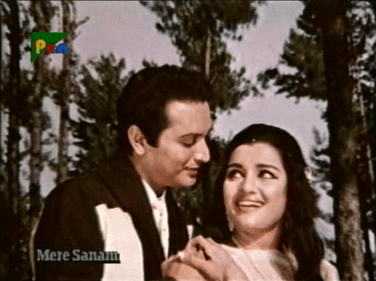
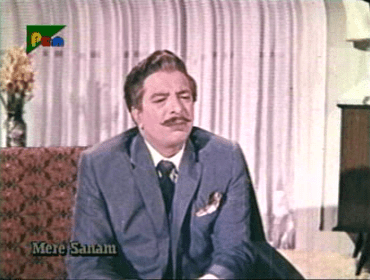
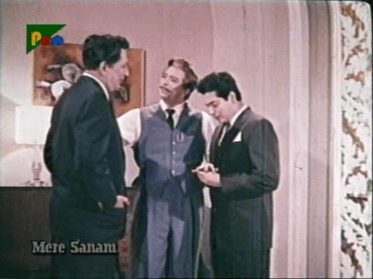
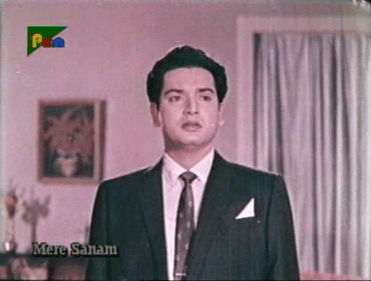
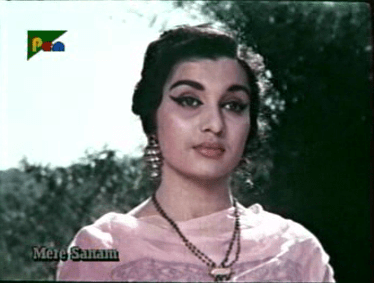
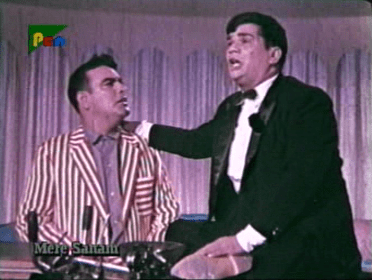
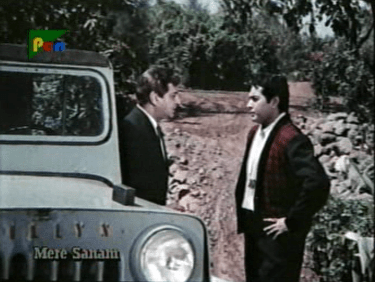
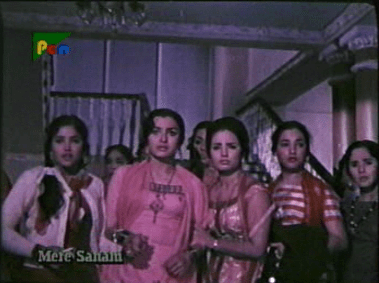
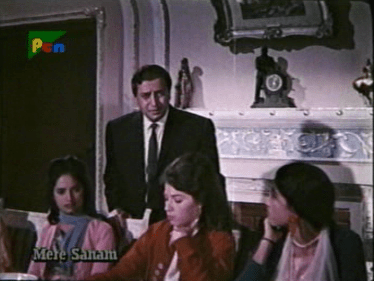

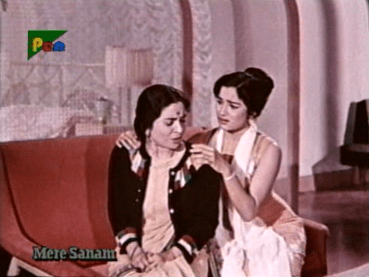
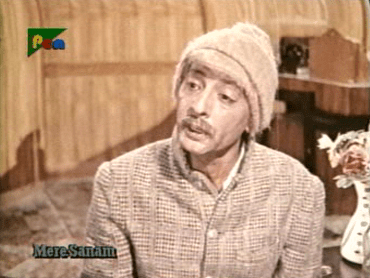
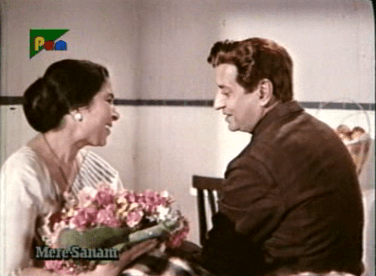
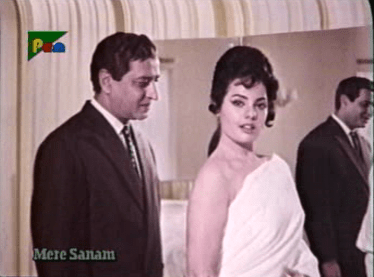

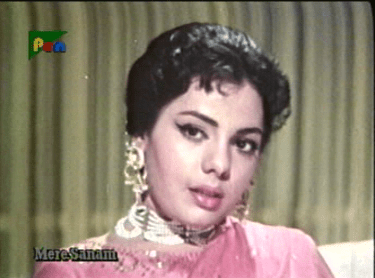
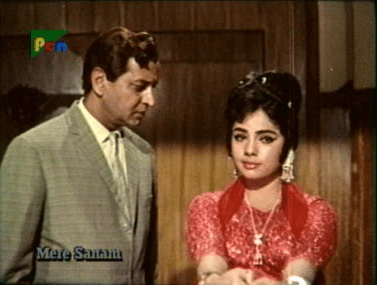
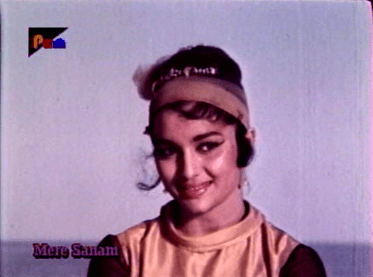
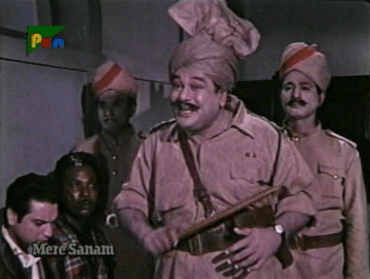
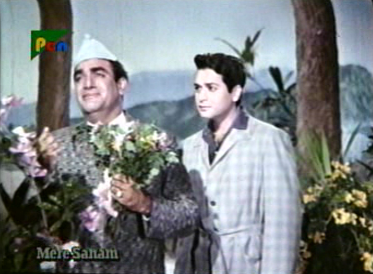
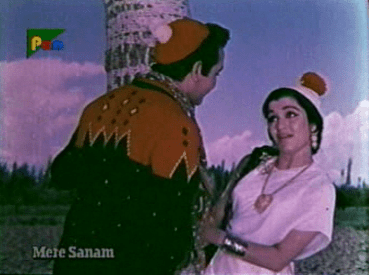
Good review, Madhu. Just a quick comment this time (am in a bit of a hurry!) but I think Pran’s henchman/old servant could be Dev Kishan. I think he is the same person in “Maine tere liye hi saat rang ke sapne chune” (Anand).
Loved the songs of Mere Sanam.”Pukarta chala hoon main” is one of my Rafi favourites too. In many respects this movie is the quintenssential 1960s film. It is about as formulaic as it gets. :-)
LikeLike
Raja, thank you – both for the comment, and for identifying Pran’s henchman. Yup, I had a look at Maine tere liye hi saat rang ke and it certainly looks like the same man. And, of course, Dev Kishan is credited in both films. Was he another Nazir Kashmiri? – always playing the servant? ;-) (Though I must admit I’ve seen Nazir Kashmiri also play the doctor in several films).
Yup, total formula, pleasant but not great. But it’s redeemed by its music – and Pukaarta chala hoon main is sublime. I adore that song.
LikeLike
Love the songs, was very small when I saw it, shades of Rock Hudson’s Come September that is the mansion being surreptitiously converted into a hotel. What I understood at that tender age I have no clue but enjoyed it.
LikeLike
That’s what matters – ‘enjoying it’! I guess that’s the fun of watching a film when you’re a child – it’s more superficial (at least it was for me), so things like an entertaining story (no matter how predictable), good songs, a nice-looking lead pair, etc are all that it takes to please. Now that I’m all grown up (and trying to be more mature!!), I realise that some of the films I enjoyed so much as a child actually aren’t that great. Many, I’m glad to say, stand the test of time and dawning maturity. ;-)
The Come September plot contrivance is also there in Kashmir ki Kali, by the way. Apparently Hindi cinema loved Come September – its title music inspired several Hindi clones.
LikeLike
Madhu, I was just going to say ‘Come September’ was reprised very many times when I realised that was redundant! :) This was one movie, though, that begged for a Shammi Kapoor! I mean, to think of Pukarta chala hoon main absolutely wasted on Biswajeet was more than one can take! But the film itself was enjoyable, so there are worse things to complain about. :)
And it is so true, what you say about films standing the test of time and nostalgia – quite a few of them don’t.
LikeLike
Yes, wasn’t it simply crying out for a Shammi Kapoor? I mean, I didn’t have complaints about Biswajit in films like Bees Saal Baad or Kohra, but Mere Sanam just screamed for Shammi. He would’ve been perfect in all the songs – a Pukaarta chala hoon main or a Tukde hain mere dil ke would have been ethereal with him. :-)
LikeLike
I haven’t watched this film. But what lovely songs. And Mumtaz, doing what she does best, wooing …
She is so young, and pert and pretty in this one.
Must watch it.
LikeLike
Yes, Mumtaz is a gem here. Not as large a role as I’d have wanted (but commendable nevertheless – she was – what – eighteen? Seventeen?), but she acts well and is very pretty. (Except in that awful costume she’s made to wear in Yeh hai reshmi zulfon ka andhera – ugh!)
LikeLike
Oh I am so glad you mentioned the caps. They look soooo out of the place with salwar kameez. It set my teeth on the edge when I saw this movie.
But as you say.. the movie is good timepass. The songs are divine. Mumtaz looks so cute, with her very young looks, running to puppy fat. I found it a bit annoying the way she keeps facing the camera resolutely while saying her lines. There is one scene where Pran actually turns her face towards him, and I was thankful to him. It could be the director, or she was a newcomer and not too familiar with camera angles. It is something I have never ever seen again in a Mumtaz movie, she simply oozes confidence in front of the camera.
LikeLike
Ah, I didn’t notice the bit about Pran turning her face towards him, though I do recall her saying all her lines to the camera. Incidentally, I was reading an interview in which Biswajit said, on working with Mumtaz in Mere Sanam, that “We were impressed. Pranji said, ‘She will go far.'” So Pran obviously saw enough in her to help tutor her a bit onscreen! I’m glad he took the trouble – Mumtaz certainly was worth it.
But, whatever. She may have been not too good with technicalities at this point, but she did prove herself even as Kammo.
LikeLike
Absolutely. Mumtaz was awesome. I just loved the tribute Shahrukh paid to her just before she was given the Filmfare lifetime achievement award.
LikeLike
I missed that. :-( Do you remember what it was?
LikeLike
i saw this long long time ago on DD and can remember was like ‘what the hell’ at all the ‘I’m incognito but not’, ‘he is mad but not’ and mostly at the Pran-Mumtaz ploy to give Biswajeet a bad name.
The only bright spots are provided by the wonderful O. P. Nayyar’s songs in the films. And it was a treat to see Mumtaz!!!
Don’t you know that the movie supposed to be called Mere Topi or Mere Topiyan, but since the censors objected to this blatant consumerism, it was given the title Mere Sanam.
LikeLike
haha.. mere topiwale sanam
LikeLike
:-))
LikeLike
“Meri topi” or “Meri topiyaan”! My goodness, Harvey, you’re a scream! ROTFL. :-))) I’m still laughing over this.
But: Mumtaz was a treat, wasn’t she? And OPN’s songs. Otherwise, the plot at least was all over the place. I have a feeling Narinder Bedi watched a clutch of Shammi Kapoor films (especially Kashmir ki Kali – the ‘mansion converted into hotel’, ‘rich man pretending to be poor’ and ‘sane man pretending to be mad’ tropes are all in that) and plugged them in here, but later forgot all about them in his hurry to get to the main point of his story (which seems to be the one he borrowed from Nasir Hussain – the ‘lost parents and child’ theme.) How original could Narinder Bedi be, really? I wonder.
LikeLike
This is such a ‘Shammi Kapoor’ film, especially the music.
Love ‘pukarta chala hun main’ which is as smooth and silky as ‘jawaniyan yeh mast mast’ from tum sa nahin dekha.
The print was so colourless and dull that the song ‘pukarta’ was effected. It distracted me a great deal.
Otherwise an entertaining film. But one keeps missing Shammi in it.
LikeLike
Yes, the print is awful, isn’t it? I think Pukaarta chala hoon main is such a wonderful ‘Kashmir road’ song (like Banda parvar thhaam lo jigar or Kisi na kisi se kabhi na kabhi, among others) that it deserves brighter, more rich colours – certainly not what it is right now. Though I must admit the picturisation itself is quite nice – perhaps the print has just suffered the ravages of time.
LikeLike
I had seen this film in the early days of my ‘old film’ obsession. I wasn’t used to drab colours and bad prints.
So what remained in my head was the pinkish colours especially during this song.
Now, after much water has flowed under the bridge and after having seen films with worse colours and some B/W films which looked like the whole film was set at night :-D, I found the film print quite good when I watched it again recently after having reading your review.
*sigh* The Music!!!
LikeLike
Oddly enough, with me it’s been the opposite – I didn’t really notice the bad print and that pinkish tinge when I first saw Mere Sanam, but it’s begun to jar in the more recent past. I guess I’ve been watching too many of those Shammi Kapoor hits – the Teesri Manzil, Junglee, Professor, etc – which are usually so beautifully preserved.
But the music makes up for everything! Sigh, indeed. :-)
LikeLike
I totally love this film… for the music, for Asha Parekh, for Mumtaz, for Pran, for Kashmir and for all the entertainment. I am not particularly fond of Biswajit and think that he is no match for the spunky Parekh. But overall, it’s a joyful film. And awesome awesome music, just awesome!!! Okay, now I’m going to see this again tonight…. Yayyyyy, thanks so much Madhu for bringing this back!!! :)
LikeLike
Yes, it’s worth watching again and again, no? Even if all of it isn’t great. Just for the ladies, for the fabulous songs, and for Kashmir. Ever since I rewatched it, I’ve been yearning to go back to Kashmir… sigh. I lived there for several years as a kid, and loved the place. It was so absolutely beautiful.
LikeLike
Yes, this film should have had Shammi Kapoor, as Pacifist says… it totally misses him!
LikeLike
Wonderful songs in this movie, especially Pukarta chala hoon main… and Jaaiye aap kahan jayenge…! I would see it if it weren’t for the fact that Biswajeet is acting in it! The parents sound like they need to go to a parenting school. Thanks for saving me the trouble of watching the movie, now that I have read your review and know it is just another remake of Come September.
LikeLike
Oh, yes – the parents certainly needed some sort of parenting school. They were horrid people. And not in the usual ‘I don’t like your choice of partner but I’ll grin and bear it’ type too, but people who were adept at emotionally blackmailing their children into doing what they wanted.
But yes, the songs – beautiful and plentiful – are a treat.
LikeLike
The one thing that I really loved was the sitar prelude of “Jaayiye Aap Kahaan”, superb stuff. OP used sitar a lot in his music.
Sarangi was usually used in the background score in the movies mostly.
LikeLike
I remember watching an Asha Bhonsle special on Doordarshan long long ago in which she was interviewed and asked to pick some of her own favourites from the songs she’d sung till then… I don’t recall the others, but Jaaiye aap kahaan jaayenge was one. I will have to listen to the song again and pay closer attention to the prelude this time!
LikeLike
You missed ” Hum ne toh dil ko aap ke qadmon mein rakh diya ”
(Asha Bhosle, Muhammad Rafi). This song is not included in the movie.
LikeLike
Lovely review, Madhulika. ‘Mere Sanam’ is not exactly a favourite but the songs are superb. It is because of the songs that I am able to sit through this film. And there are PLENTY of songs so that’s a good thing again. You’re right about the caps, they are there in almost every Kashmir scene. Luckily, Mumtaz didn’t wear one in that ‘Yeh hai reshmi zulfon ka andhera’ number.
LikeLike
“Luckily, Mumtaz didn’t wear one in that ‘Yeh hai reshmi zulfon ka andhera’ number.”
Your words conjured up an image so vivid that I still can’t stop giggling, Hansda!
Yes, and teamed with that less-than-flattering gold and black leotard-like thing she was wearing in that song, a cap would’ve been the ultimate accessory. ;-)
But the songs – and so many of them, too, thankfully – are absolutely wonderful. They’re really the main reason I don’t mind watching this film again and again (Asha Parekh is another attraction for me).
LikeLike
Yesterday i was reading an old magazine uploaded on this website…It was small biographies of old actresses…Cannot find the same..Can you please help me.
LikeLike
No, I’ve never uploaded anything of the kind on my blog. I do recall Greta (at memsaabstory) posting something like that. You could check her blog.
LikeLike
Thanks for your reply…Yes it is under memsaabstory.
LikeLike
You’re welcome. :-)
LikeLike
What was the music playing in the background when Biswajeet was fighting the dancer who’s bothering Asha Parekh in the movie?
LikeLike
Sorry, I don’t know. It sounds very familiar (at times a bit like Tequila?), but I’m not sure.
LikeLike
There was another song that had been composed for Mere Sanam – Hamne to dil ko aap ke kadmon pe rakh diya – but was not included in the film. I asked Narinder why and he said the film had become too long and they had to leave out one song – so I said why this one, ok he said which one should we have left out! I had no answer to that!
He did want Shammi for this film, who was also a friend (drinking buddy). He said – I got late registering the story of ‘Come September” for Mere Sanam and Kashmir ki Kali was registered first – and Shammi was cast for it. (Apparently the bit about turning the house into a hotel was from Come September!).
LikeLike
Yes, the house-turned-into-hotel trope was there in Come September. I remember thinking, “Ah! So that’s where they got it!” when I watched Come September the first time.
“ok he said which one should we have left out! I had no answer to that!”
I can imagine! All the songs in that film are superb. I can’t imagine Mere Sanam without Pukaarta chala hoon main or Jaaiye aap kahaan jaayenge or Yeh hai reshmi zulfon ka andhera… or several others, too, perhaps not as well-known, but also fabulous.
LikeLike
Hi
LikeLike
? What happened? Do please post your comment. :-)
LikeLike